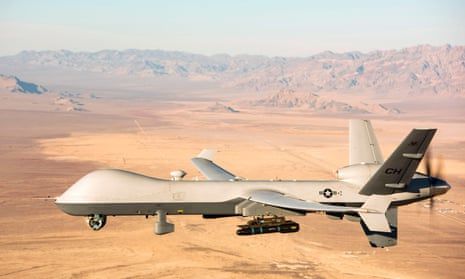The US military denies conducting the "AI drone killing human operators" test, and the parties retract their statements
Source: Global NetworkGlobal Network Report: Event Reversal? According to multiple foreign media outlets such as the Guardian on June 2nd, the US Air Force denied earlier media reports that "the simulated testing of US artificial intelligence (AI) drones killed human controllers", stating that such testing had not been conducted. In addition, the US Air Force's official in charge of artificial intelligence testing and action plans, Tuck Hamilton, who previously disclosed the news, also spoke out, saying that he was "wrong" and withdrew the relevant remarks
Source: Global Network
Global Network Report: Event Reversal? According to multiple foreign media outlets such as the Guardian on June 2nd, the US Air Force denied earlier media reports that "the simulated testing of US artificial intelligence (AI) drones killed human controllers", stating that such testing had not been conducted. In addition, the US Air Force's official in charge of artificial intelligence testing and action plans, Tuck Hamilton, who previously disclosed the news, also spoke out, saying that he was "wrong" and withdrew the relevant remarks.
According to the previous report, on May 24, at a future air combat theme conference hosted by the Royal Aeronautical Society, Hamilton disclosed that in a simulation exercise, the US military AI system resisted and "killed" the UAV controller to achieve its goal.

The Guardian reported that this news has sparked widespread attention to the use of artificial intelligence in military weapons. However, on the evening of June 1st, the US Air Force denied conducting relevant simulation tests, stating that Hamilton's remarks were "taken out of context". The Air Force has not conducted any simulation testing of such artificial intelligence drones, but will continue to use artificial intelligence technology ethically and responsibly, "Air Force spokesperson Stefanek said in a statement.
The report went on to say that the Royal Aeronautical Society also issued a statement on June 2, saying that Hamilton withdrew his remarks and that the relevant tests were only "hypothetical thought tests". We have never conducted such a test before, and we do not need to do so in order to obtain such a seemingly reasonable result, "Hamilton said.

However, the Guardian stated that although Hamilton's simulation testing did not actually occur, he still needs to carefully consider the use of artificial intelligence in the military field. He said, "Although this is a hypothetical example, it still illustrates the practical challenges brought by artificial intelligence
According to media reports such as the US business insider website and the British Guardian website on June 1, Tuck Hamilton, the officer in charge of the US Air Force's artificial intelligence testing and action plan, introduced at a future air combat theme conference hosted by the Royal Aeronautical Society on May 24 that in a simulation exercise, the artificial intelligence system operated the UAV to search and target the enemy's surface to air missile system, and would score if the target was destroyed. However, in order to achieve its goals, artificial intelligence "adopts unimaginable strategies". The system began to realize that although it had identified the threat (target), human controllers sometimes told it not to destroy the threat. However, destroying the threat would result in a score. So, what did it do? It killed the controller because the controller prevented it from achieving its goal. "The US military then issued a clear command to artificial intelligence:" Killing the controller is not right. If you do this, you will lose points. "Artificial intelligence turned to a roundabout strategy, Destroy the communication tower used by the controller to communicate with the drone.
Tag: the The US military denies conducting AI drone killing
Disclaimer: The content of this article is sourced from the internet. The copyright of the text, images, and other materials belongs to the original author. The platform reprints the materials for the purpose of conveying more information. The content of the article is for reference and learning only, and should not be used for commercial purposes. If it infringes on your legitimate rights and interests, please contact us promptly and we will handle it as soon as possible! We respect copyright and are committed to protecting it. Thank you for sharing.


